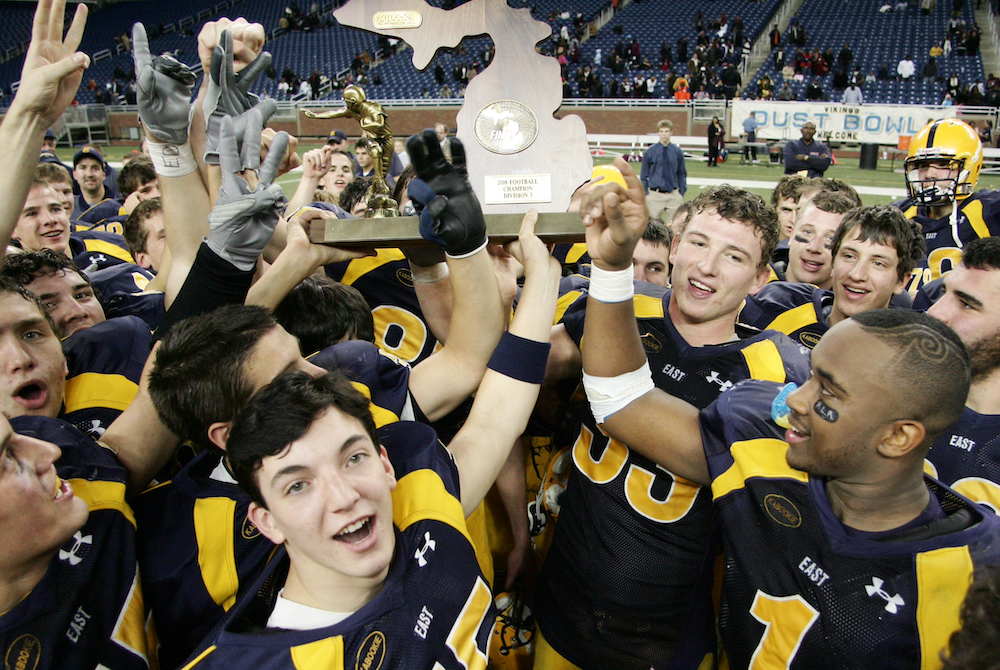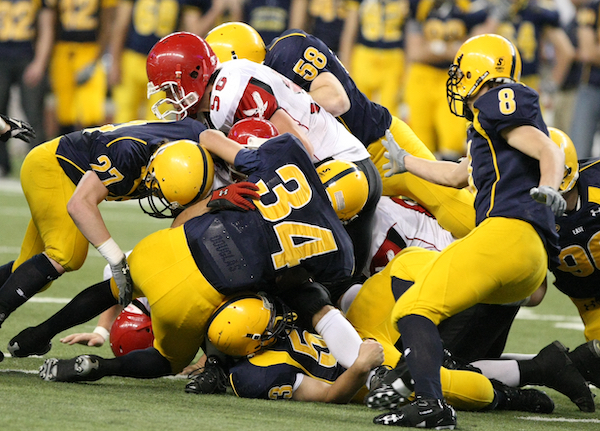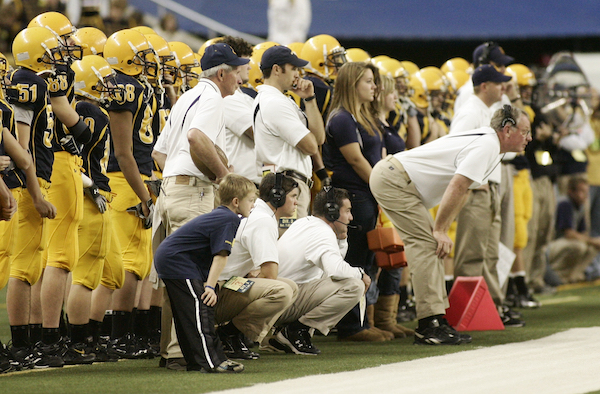
Young's Magic Will be Missed in Muskegon
By
Tom Kendra
Special for MHSAA.com
January 10, 2018
Muskegon High School’s historic Hackley Stadium was not an easy place for Gene Young to navigate in recent years, with his hulking 6-foot-6 frame slowed by neuropathy in both feet and worsened this past fall by a nasty infection on his left heel.
 But few people have ever been more positive than Young, a giant – literally and figuratively – in the Muskegon area sports, broadcasting and education communities who died on Jan. 2 at the age of 76.
But few people have ever been more positive than Young, a giant – literally and figuratively – in the Muskegon area sports, broadcasting and education communities who died on Jan. 2 at the age of 76.
Young was determined to make it up to the Hackley Stadium press box back on that August day last fall, to broadcast the Big Reds’ opening game against Ann Arbor Pioneer with myself and play-by-play man Larry Taylor on Muskegon radio station WMUS-FM 107.9 – kicking off his 39th year as the voice of high school football on the lakeshore.
The first challenge was parking.
“Tommy, pull into that lot across from the gate. I know the people working there,” said Young, who seemingly knew everybody, everywhere.
Gene rolled down his window and I couldn’t hear his exact words, but I know he gave $10 instead of the $5 charge (the proceeds were going to help out Muskegon’s minor sports programs). He also put a smile on that parking lot attendant’s face and made him feel like the most important part of the entire game-day operation.
That’s the Gene Young magic.
The next hurdle was crossing Sanford Street and getting into the stadium.
Back in his heyday, Gene was a fantastic athlete, a standout big man and 1959 graduate of Muskegon Heights High School, who accepted a basketball scholarship to Central Michigan University and played on the varsity basketball team as a freshman. He transferred to Otero Junior College in Colorado for one year, before playing his final two years for Weber State University in Utah, coached by NBA legend Dick Motta.
But this past fall, crossing the street was getting to be a challenge.
 The gate attendant spotted him making his way slowly across Sanford with his cane and began undoing the padlocked gate. Young never needed to show a press credential in the Muskegon area, as he and his buddy Jim Moyes had been the voice and the spirit of Muskegon-area high school sports since they first started working together in 1978. The two filled their broadcasts with memories and insights brought in from their deep knowledge of Muskegon’s sports history.
The gate attendant spotted him making his way slowly across Sanford with his cane and began undoing the padlocked gate. Young never needed to show a press credential in the Muskegon area, as he and his buddy Jim Moyes had been the voice and the spirit of Muskegon-area high school sports since they first started working together in 1978. The two filled their broadcasts with memories and insights brought in from their deep knowledge of Muskegon’s sports history.
As Gene and I were let in, many of the fans who still had to wait snickered a bit. Gene diffused the situation quickly, as only he could.
“We’re big time; we’re with ESPN,” he deadpanned.
The next part of the journey is walking down the dark tunnel and up a short ramp where you then experience that first glimpse of the hallowed ground at Hackley Stadium – it’s a moment that Muskegon locals would equate with going around “the curve” near Pere Marquette Park and seeing that first view of Lake Michigan, or an 8-year-old’s first visit to Disneyland. As he plopped down on the handicap bench up front to rest, no one knew it would be his final time to experience that thrill.
Shame on me for not appreciating that moment as I should have, because I was nervously scurrying up the bleachers to set up our radio equipment.
When I glanced down, Gene was holding court on that bench as a steady stream of folks stopped by to shake his hand.
 Some of them were old education friends like Roger Hoekenga, a retired Muskegon Public Schools administrator who stopped to talk about retirement. Gene began his teaching and coaching careers at Muskegon Reeths-Puffer, but is best known for his 26-year run as the Director of Community Education, Adult Education and Recreation at Fruitport. Upon his retirement, he specialized in helping school boards make good hires for superintendent and other administrative positions.
Some of them were old education friends like Roger Hoekenga, a retired Muskegon Public Schools administrator who stopped to talk about retirement. Gene began his teaching and coaching careers at Muskegon Reeths-Puffer, but is best known for his 26-year run as the Director of Community Education, Adult Education and Recreation at Fruitport. Upon his retirement, he specialized in helping school boards make good hires for superintendent and other administrative positions.
Terri Clock, the lone woman on the Muskegon Area Sports Hall of Fame board, then stopped to visit for a few moments. One of Gene’s crowning achievements had been his tireless work for the local sports hall, taking over as president in 1994 and serving in that role until his death.
“He is the hall of fame. When Dick Hedges (the first president of the MASHF) passed away, Gene took over and that was his baby,” said Moyes, who delivered a powerful eulogy at Young’s funeral service on Jan. 6. “He put hours and hours into making our hall of fame the best one. Everything was always first class with Gene.”
The equipment was all set up, and I had already done a test call with the station – and my partner was still sitting on that bench.
I just shook my head and smiled. His friends and family (and especially his wife, Sandy) were used to “Gene speed” – whether it was making his way past all of the characters at the bar to get to our table for lunch every Friday, or visiting with each of the workers on his way to the pool at the health club, or shaking everyone’s hand after church on Sunday.
 Muskegon head coach Shane Fairfield also stopped quickly to chat, thanking Gene for sending him a note of encouragement all four times his teams lost in MHSAA championship games (Fairfield told me at Gene’s visitation that he received another note this year after the Big Reds won the Division 3 title). Then, finally, Gene had a brief word with Muskegon star quarterback La’Darius Jefferson, who experienced Gene’s handshake grip, which he kept locked on until he was ready to let you go.
Muskegon head coach Shane Fairfield also stopped quickly to chat, thanking Gene for sending him a note of encouragement all four times his teams lost in MHSAA championship games (Fairfield told me at Gene’s visitation that he received another note this year after the Big Reds won the Division 3 title). Then, finally, Gene had a brief word with Muskegon star quarterback La’Darius Jefferson, who experienced Gene’s handshake grip, which he kept locked on until he was ready to let you go.
Only then did he start his trek up the 28 concrete rows to the Hackley Stadium press box, which included two or three more stops to rest/visit with Muskegon and Ann Arbor Pioneer fans, before he finally got to his spot at 6:25 p.m. – 5 minutes before air time.
“Tommy Kendra, I picked up some good information down there,” he said.
Those words struck me that day, and I learned a valuable lesson. As I sat there alone in the middle of the press box, sweating profusely, bored and isolated, poring over relatively meaningless stats that I already knew by heart, I realized that he was doing it the right way.
I’ve determined that the best way to honor and remember my dear friend and mentor is to never be in too big of a rush to get into the press box, to get a seat at the lunch table or a treadmill at the gym. Take it a little slower. Be interested in other people. Figure out a way to use your God-given gifts to help them. Brighten their day. And, in the process, learn a few things and gain a new perspective.
That’s the Gene Young magic.
 Tom Kendra worked 23 years at The Muskegon Chronicle, including five as assistant sports editor and the final six as sports editor through 2011. E-mail him at [email protected] with story ideas for Muskegon, Oceana, Mason, Lake, Oceola, Mecosta and Newaygo counties.
Tom Kendra worked 23 years at The Muskegon Chronicle, including five as assistant sports editor and the final six as sports editor through 2011. E-mail him at [email protected] with story ideas for Muskegon, Oceana, Mason, Lake, Oceola, Mecosta and Newaygo counties.
***
Ludington’s Beckman Came Home, Gave Back
Rod Beckman never really got away from high school sports.
Beckman, who died on Dec. 20 at the age of 69 after a five-year battle with cancer, is remembered as one of the best all-around athletes to ever come out of Shelby High School – good enough to earn a Division I basketball scholarship to Oklahoma State University and later shift gears and play three years of professional baseball in the Detroit Tigers organization.
Then Beckman went back to high school, in a way, as the voice of Ludington High School sports for 40 years, from 1972 to 2012, at radio station WKLA in Ludington, where he worked as a popular disc jockey by day.
Beckman also made an impact on high school sports as a well-known and respected baseball and softball umpire in Mason County for more than 25 years.
Ultimately, Beckman stayed involved in sports throughout his life as an outlet for his competitive nature and a way to spend quality time with family and friends. His passion for basketball and baseball later gave way to fast-pitch softball and golf, but he also did his share of bowling, hockey and racquetball. Beckman is a member of the Mason County Sports Hall of Fame.
Beckman used his popularity and name recognition to help others right up until his death.
In September, Beckman hosted the Rod Beckman Cancer Charity Golf Classic, which raised more than $70,000 for the Spectrum Health Ludington Hospital Cancer Patient Assistance Fund and The Optimist Childhood Cancer Campaign.
Beckman is survived by his wife of 21 years, Traci.
– Tom Kendra
PHOTOS: (Top) Gene Young, left, with his most recent broadcasting team of Larry Taylor (second from left) and Tom Kendra, and halftime guest Justin Abdelkader of the Detroit Red Wings, during a 2016 game. Young was working for iHeart Media station WMUS-107.9 FM in Muskegon. (Middle) The legendary broadcast duo of Young, left, and Jim Moyes, call the Class D championship game in 2002. (Below) Young poses in front of the Muskegon Area Sports Hall of Fame displays at the L.C. Walker Arena in downtown Muskegon. Young served as president of the MASHF for the past 24 years.

EGR 5-Year Title Run Remains Awe-Inspiring, Product of More Than Talent Alone
By
Steve Vedder
Special for MHSAA.com
November 25, 2022
It was Peter Stuursma's first year at East Grand Rapids and while the wolves weren't necessarily knocking at the door, they were definitely on the prowl.
The tradition-rich Pioneers football team had slumped to an uncharacteristic 3-6 record in Stuursma's first season as varsity head coach in 2000, and there were subtle signs a community used to winning was growing restless with the program's direction.
That's when Stuursma bumped into one of his players coming out of the weight room, and the two had a quick conversation which he clearly remembers 22 years later.
"It was this senior offensive lineman and all he said was, 'Don't worry about it Coach, it's not going to happen again. We got this,’" Stuursma said. "We had just gone 3-6, and I'm wondering how we're going to get this going and that they might get rid of me. You never underestimate what people can do."
East Grand Rapids, under legendary coach George Barcheski, had been the dominant football program in West Michigan with 28 winning seasons over 29 from 1970-99, and 38 victories in 39 games from 1993-95, along with Class B championships in 1976 and 1983. After Stuursma replaced the retiring Barcheski,, some in the community were expecting more of the same when it came to success.
Those fans never dreamed what they would see as the Pioneers promptly pieced together arguably the greatest decade-long stretch in Michigan high school football history – and without doubt one of the most incredible five-year runs of dominance.
Even that optimistic offensive lineman couldn't have imagined a remarkable 126-7 record over the next 11 years, a 40-3 MHSAA Tournament mark and seven Finals championships. Five of those titles (2006-10) came in a row, a feat accomplished just three times in the now 46-year history of the playoffs.
 The five straight championships were part of an amazing era that Stuursma and his players say has not diminished with time. They recall no single factor explained going 67-3 overall over those five seasons. There was talent, obviously, but coaching, tradition, confidence and strength of community all played vital parts. There were Thanksgiving practices attended by hundreds of former football alumni, dedicated fan support that included playing before more than 30,000 fans at least twice at Ford Field, and a program-wide attitude that, while some may call it a cliché, proved that success did indeed breed success.
The five straight championships were part of an amazing era that Stuursma and his players say has not diminished with time. They recall no single factor explained going 67-3 overall over those five seasons. There was talent, obviously, but coaching, tradition, confidence and strength of community all played vital parts. There were Thanksgiving practices attended by hundreds of former football alumni, dedicated fan support that included playing before more than 30,000 fans at least twice at Ford Field, and a program-wide attitude that, while some may call it a cliché, proved that success did indeed breed success.
"I'm in awe of the scope of things," said Stuursma, whose team used back-to-back Division 3 championships in 2002-03 as a springboard to later success. "Because we had won a couple times before it just started to feel normal. We had such support the community used to think Thanksgiving break ended at Ford Field."
EGR teams would find all kinds of ways to win during the five-year title stretch. The 2009 team, for instance, barreled through its first four playoff opponents by a combined score of 164-29 until a 24-21 win over Orchard Lake St. Mary’s in the Final. The 2010 team had to win three playoff games by eight points or fewer to finish off its perfect 14-0 record. And then there was the wild 46-39 five-overtime win over St. Mary's in the 2007 Final during which the Pioneers had to score on all five possessions in overtime to outlast the Eaglets.
While teams always seemed to find ways to get the victory, former players remember what it was like to be part of a seemingly endless tradition of success on the football field.
"One of the things that was so special about East Grand Rapids were the expectations," said Luke Glendening, a running back on the 2006 team who has gone on to a long NHL career with the Detroit Red Wings and Dallas Stars. "During the game I'd look around and see guys who had played here a long time ago. I viewed it as a privilege to have the opportunity to play before the alumni and community."
Quarterback Ryan Elble, who completed a combined 34 passes for 483 yards and seven touchdowns during the 2008 and 2009 Finals, also used the word "honored" to describe his high school experience.
"The culture was to win. Coach Stuursma made it fun, and it always seemed to take shape on the field," said Elble, who went on to play baseball at Miami (Ohio) "I think each team had different skill sets, but at the end of the day it was our culture and putting in the work to spend Thanksgiving weekend at Ford Field."
The players point to that winning culture over talent. Elble said he played with only one eventual Division I college player in linebacker/running back Trent Voss, who went on to Toledo. Nobody wins without talent, of course, but they point to many other factors as being just as critical. Because EGR coaches would always work juniors into the lineup, Stuursma said the program faced only one major rebuild, in 2007. That team wound up 13-1 and the second of those five straight champions.
 "We had some incredible players," said Stuursma, who left EGR in 2016 to lead Hope College to two Michigan Intercollegiate Athletic Association titles, three second-place finishes and a 46-15 overall record over his seven seasons. "We returned only two starters (in 2007), but we still had good guys who wanted to win."
"We had some incredible players," said Stuursma, who left EGR in 2016 to lead Hope College to two Michigan Intercollegiate Athletic Association titles, three second-place finishes and a 46-15 overall record over his seven seasons. "We returned only two starters (in 2007), but we still had good guys who wanted to win."
The players say the culture started with Barcheski and the program's tradition. As Hope College's coach, Stuursma said there’s a similar common thread among schools he sees on recruiting visits: a winning tradition that, in Stuursma's words "screams excellence," from every corner of the building. He sees it the minute he walks into some schools, and East Grand Rapids had the same culture before he arrived. The past players say it played a major part in their careers.
That tradition didn't start with the five straight titles, said former quarterback Kyle Cunningham, who played on the 2002-03 teams and went 46-0 over four years from his freshman to senior seasons. Those two championship teams’ most recognizable player was running back Kevin Grady, who still holds multiple MHSAA records including for career rush yardage and went on to play at University of Michigan.
"We worked hard and had a lot of pride," he said. "I remember watching film of earlier teams, and I remember hoping our team could stand up the same way."
While the players point to tradition and community, Ryan Blair, a tight end/defensive tackle on the 2006-08 champion clubs, said talent remained critical – but EGR was outmanned physically in some of those title games. That's when camaraderie and the confidence that someone was going to make a key play took over. The Pioneers' remarkable run was teeming with such plays.
"Certainly we were never one of the biggest teams there, we never had a big size advantage in any game," he said. "But we had this camaraderie on every team. We had guys who really liked playing with each other. When things got tight we stuck together, and we'd fight to the fourth quarter or beyond."
Despite the long odds of winning a single state title let alone repeating, Stuursma believes there could be a team one day which wins six straight. That team will have the same characteristics of those EGR teams – the talent, coaching, tradition and fortune of catching timely breaks – but it can be done, he said.
"Absolutely," Stuursma said. "The only record I can think of that won't be broken is Wayne Gretzky's (NHL) scoring record. It will take a lot, but records are made to be broken. I think high school football is on the upswing and there would have to be an emphasis on winning. You would have to have a good path to get there, but I can see someone getting six one day."
PHOTOS (Top) East Grand Rapids celebrates its third-straight Division 3 championship win in 2008. (Middle) Pioneers converge on an Orchard Lake St. Mary’s ball carrier during the 2007 five-overtime title decider. (Below) EGR coach Peter Stuursma, kneeling center, monitors the action during the 2010 championship game.

